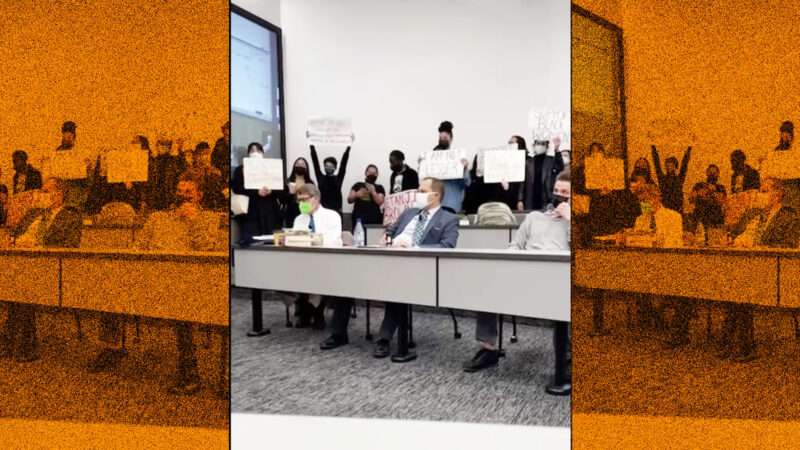
University of California, Hastings College of the Law is in San Francisco, California. Its most famous alumnus is Vice President Kamala Harris.
Earlier this week, UC Hastings hosted what was supposed to be a discussion between two professors on the opportunities afforded by Associate Supreme Court Justice Stephen Breyer's recent vacancy. The college's chapter of the Federalist Society, a conservative legal group, organized the event, which featured Rory Little, a UC Hastings law professor representing the liberal viewpoint, and Ilya Shapiro, executive director of Georgetown University's Constitution Center, representing the libertarian right.
The discussion did not take place. Several dozen student protesters affiliated with the campus's Black Law Students Association (BLSA) drowned out Shapiro whenever he tried to speak, interrupting the event for its entire planned hour. Administrators' repeated pleas to let the discussion proceed were ignored by the activists, who chanted "Black Lives Matter" over and over again until Shapiro eventually gave up.
The students had deemed Shapiro an illegitimate speaker due to controversial comments he made a little more than a month ago about President Joe Biden's commitment to nominating a black woman to the Supreme Court. In late January, Shapiro tweeted that he believed Biden's pledge to nominate at least in part based on race and gender would preclude him from selecting the most qualified liberal jurist, Sri Srinivasan. He used the unfortunate phrase "lesser black woman" to describe a theoretical Biden pick; Shapiro later clarified that he did not mean to suggest black women were in any way lesser, but rather that Srinivasan—an Indian man—was the most qualified progressive judge of all.
"I regret my poor choice of words, which undermine my message that no one should be discriminated against for his or her gender or skin color," he told Reason at the time.
Shapiro made a full apology to everyone hurt by his regrettable phrasing. But Georgetown opted to place him on leave pending an investigation. (It had been his first week on the job; Shapiro previously worked as a vice president at the Cato Institute, a libertarian think tank.)
The Foundation for Individual Rights in Education (FIRE) has criticized the suspension, noting that it violates the university's commitment to the principles of academic freedom.
"When it comes to protected speech, there is nothing to investigate," wrote FIRE in a statement.
A great number of voices on the right, left, and center have all reached the same conclusion: The New York Times' Nikole Hannah-Jones and Michelle Goldberg; The Atlantic's Adam Serwer; Common Sense Substacker Bari Weiss; The Volokh Conspiracy's Eugene Volokh (hosted by Reason); and many others.
The Federalist Society had secured Shapiro's participation in the UC Hastings event prior to the controversy. The BSLA learned about it just a day before it was scheduled to occur, but this gave them plenty of time to show up in full force and shut it down.
Students mockingly chant "say it to her face, coward" as a number of activists confront Shapiro directly at the speaker podium. One actually gets in his face: https://t.co/YHFLeLsLfY pic.twitter.com/oO8XHRXGL7
— Nate Hochman (@njhochman) March 2, 2022
As National Review's Nate Hochman notes, the students also released a list of further demands that include mandatory, intensive training in "critical race theory" for both faculty and students.
At one point, Morris Ratner—UC Hastings' dean of academics—attempted to quiet the students. He commended their passion and said they were welcome to protest with signs, but asked them to allow the event to actually proceed, per the college's free speech policies.
"Free speech, including the right to do the form of expression I see on these signs, is a key right that we are required to uphold," said Ratner. "I applaud those of you who want to express your views. There is a way to do that consistent with our institutional codes and norms." The students then interrupted and loudly booed him.
"We have a Q&A portion here," Ratner continued. "I know Professor Little intends to directly address and confront our speaker on some of the views that he has expressed, and there is a Q&A built in." The students refused to heed this advice.
"It's too bad that a heckler's veto prevailed here, but I'd welcome the opportunity to return to Hastings—or anywhere else—to discuss the Supreme Court, constitutional law, and other areas where I may have expertise," Shapiro tells Reason.
UC Hastings put out a statement reaffirming its commitment to free speech and noting that the protesters had violated the student code.
"Disrupting an event to prevent a speaker from being heard is a violation of our policies and norms, including the Code of Student Conduct and Discipline, Section 107 ('Harmful Acts and Disturbances'), which the College will—indeed, must—enforce," said Ratner in a statement.
I pressed Ratner for more details about what kind of action would be taken, but the college declined to comment further.
Law students should have a greater appreciation for spirited and open engagement with provocative ideas than other progressive student activists, but this was obviously not the case at UC Hastings.
The post UC Hastings Law Students Silence Conservative Speaker, Demand Anti-Racism Training appeared first on Reason.com.







